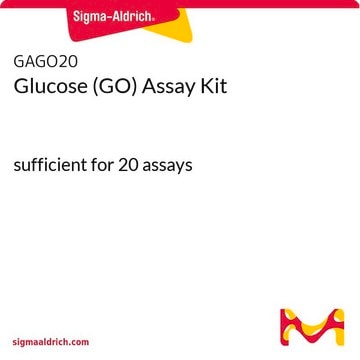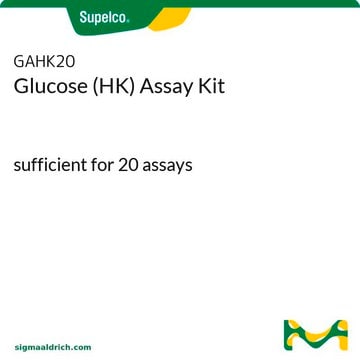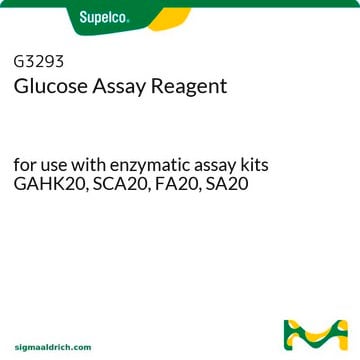T8778
Trehalase from porcine kidney
buffered aqueous glycerol solution, ≥1.0 units/mg protein
Synonym(s):
α,α-Trehalose glucohydrolase
Sign Into View Organizational & Contract Pricing
All Photos(1)
About This Item
CAS Number:
MDL number:
UNSPSC Code:
12352204
NACRES:
NA.54
Recommended Products
form
buffered aqueous glycerol solution
specific activity
≥1.0 units/mg protein
concentration
0.5-10.0 mg/mL protein (BCA)
storage temp.
−20°C
General description
Trehalase is a glycosidase that occurs in many forms and is found in all tissues. It belongs to the glycoside hydrolase 37 (GH37) family of the carbohydrate-active enzyme (CAZy) classification.
Trehalose is the main haemolymph sugar in most insects and is potentially a prime target for an invading pathogenic fungus.
Application
Trehalase has been used:
- in a study to assess changes in carbohydrate metabolism in Plasmopara viticola-infected grapevine leaves
- in a study to investigate growth arrest by trehalose-6-phosphate
- to quantify the intracellular trehalose in Lactobacillus casei cells
Biochem/physiol Actions
Trehalase catalyzes the hydrolysis of trehalose to produce two glucose units. It mediates flight metabolism, molting induced chitin production and tolerance towards cold temperature.
Unit Definition
One unit will convert 1.0 μmole of trehalose to 2.0 μmoles of glucose per min at pH 5.7 at 37 °C (liberated glucose determined at pH 7.5).
Physical form
Solution in 50% glycerol containing 1% Triton™ X-100 and 25 mM potassium phosphate, pH 6.5
Legal Information
Triton is a trademark of The Dow Chemical Company or an affiliated company of Dow
Storage Class
10 - Combustible liquids
wgk_germany
WGK 2
flash_point_f
Not applicable
flash_point_c
Not applicable
Certificates of Analysis (COA)
Search for Certificates of Analysis (COA) by entering the products Lot/Batch Number. Lot and Batch Numbers can be found on a product’s label following the words ‘Lot’ or ‘Batch’.
Already Own This Product?
Find documentation for the products that you have recently purchased in the Document Library.
Customers Also Viewed
Shari Dhaene et al.
Journal of enzyme inhibition and medicinal chemistry, 35(1), 1964-1989 (2020-11-10)
Although trehalose has recently gained interest because of its pharmaceutical potential, its clinical use is hampered due to its low bioavailability. Hence, hydrolysis-resistant trehalose analogues retaining biological activity could be of interest. In this study, 34 4- and 6-O-substituted trehalose
Growth arrest by trehalose-6-phosphate: an astonishing case of primary metabolite control over growth by way of the SnRK1 signaling pathway
Delatte, T., et al.
Annual review of plant physiology and plant molecular biology, 157, 160-174 (2011)
Trehalose-hydrolysing enzymes of Metarhizium anisopliae and their role in pathogenesis of the tobacco hornworm, Manduca sexta
Xia Y, Clarkson JM, Charnley AK.
J. Invert. Path., 80(3), 139-147 (2012)
Jie Chen et al.
PloS one, 5(4), e10133-e10133 (2010-04-21)
Trehalase, an enzyme that hydrolyzes trehalose to yield two glucose molecules, plays a pivotal role in various physiological processes. In recent years, trehalase proteins have been purified from several insect species and are divided into soluble (Tre-1) and membrane-bound (Tre-2)
Jiangnan Luo et al.
PloS one, 9(6), e99732-e99732 (2014-06-14)
A set of 14 insulin-producing cells (IPCs) in the Drosophila brain produces three insulin-like peptides (DILP2, 3 and 5). Activity in IPCs and release of DILPs is nutrient dependent and controlled by multiple factors such as fat body-derived proteins, neurotransmitters
Our team of scientists has experience in all areas of research including Life Science, Material Science, Chemical Synthesis, Chromatography, Analytical and many others.
Contact Technical Service










